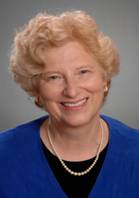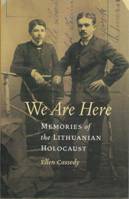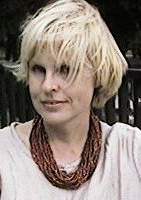
THE VOICE OF INTERNATIONAL LITHUANIA
|
VilNews has its own Google archive! Type a word in the above search box to find any article.
You can also follow us on Facebook. We have two different pages. Click to open and join.
|
 Ellen Cassedy |
 The book We are Here |
 Daiva Markelis |
Professor Daiva Markelis, Illinois: Essay/review of Ellen Cassedy's book We Are Here
I’ve always been interested in Lithuanian history and, lately, in Jewish-Lithuanian history. Jews have been living in Lithuania since the 1300s, have contributed to the work of nation building throughout the centuries, suffered alongside their Christian neighbors during the reign of the tsars. Despite their once considerable numbers—over seven percent of the population at one time—and formidable achievements, I don’t remember ever reading about them in Lithuanian Saturday School vadoveliai, readers filled with patriotic poems, variations of stories about the founding of Vilnius involving a dream about an iron wolf, and photographs of storks nesting atop the thatched roofs of simple country cottages. (Every year the same stork seemed to appear in yet another edition of the book.)
At home, my mother talked about a Jewish friend she’d had in Klaipeda. My father remembered a Jewish peddler who sold fabric and buttons. So, yes, Jews had lived in Lithuania, but only a handful over six centuries—that’s the impression I received. Soon after Lithuania regained her independence, I learned from my Aunt Birute about the once-thriving Jewish community in Dusetos: “This was a grocery store,” she said as we walked down Kazys Buga Street, “and here stood a bakery, and beyond that, over there, the best restaurant in town.”
I tell the Dusetos story to Ellen Cassedy, author of We Are Here: Memories of the Lithuanian Holocaust, recently published by the University of Nebraska Press, over coffee at the Corner Bakery. She nods: “The collapse of the Soviet Union made it possible for people to speak openly about what happened during the occupation. During both of the occupations, Communist and Nazi.”
Ellen had emailed me a few months earlier, having gotten my name from a mutual acquaintance who knew I’d be at the Association of Writers and Writing Programs Conference in Chicago. She is a warm, elegant woman with a crown of curly blond hair, a good listener and asker of questions, befitting her background as a journalist. I’ve been acquainted with her for all of thirty minutes and already she knows that both my first language and first husband were Lithuanian, that I’ve kept my maiden name, that my second husband is of Bohemian and Greek descent (and a keeper), that my parents immigrated to the United States in the 1940s, that I’ve visited Lithuania four times. I know that Cassedy’s Jewish great-grandmother had worked on a dairy farm, supervising the Lithuanian workers and keeping the books; that her grandfather had been a religious scholar, that he had escaped to the United States to avoid the czarist draft.
We’ve talked about the perils and pleasures of publishing books and the highs and lows of academic conferences.
“What do you think of Val Adamkus?” she asked, referring to the former president of Lithuania and a long-time resident of Hinsdale, Illinois.
“I love Adamkus. I used to work as a waitress at a golf resort he owned in Michigan back in the Seventies. He was a friend of my father’s.”
“Do you know Al Domanskis?” she continued.
“There’s one degree of separation for Lithuanians living in Chicago. So, yes.”
Domanskis is a prominent Lithuanian lawyer and activist involved in efforts to promote Jewish-Lithuanian dialogue.
Other Lithuanians we know (or know of) include Julija Sukys, whose Epistolophilia: Writing the Life of Ona Simaite, also published by the University of Nebraska Press, recounts the struggles of the Vilnius librarian who helped save Jews and was deported to Dachau; Ina Navazelskis, who works in the United States Holocaust Memorial Museum; and Saulius Suziedelis, the noted professor and historian who writes extensively about the Holocaust in Lithuania.
As our talk shifts to the Holocaust, I realize I’m a little worried for Ellen. Not all Lithuanians will greet her book with the interest, respect, and admiration of the above-named individuals.
“You’re going to receive some flak,” I say.
“Really?” she says, sounding sincerely surprised.
Perhaps I’m being presumptuous. I haven’t read the book yet, after all. And one of the blurbs on the back is by Adamkus, a man highly respected, even idolized, by a large number of diaspora Lithuanians. Adamkus writes that We Are Here "can help us to reach out, open our hearts, and rediscover one another in the spirit of mutual understanding."
But I know from experience that Lithuanian complicity in the Holocaust is a topic most Lithuanians wish would just go away. Some deny that Lithuanians were involved in the massive killings, despite countless eyewitness accounts and historical research from a wide range of highly respected scholars. Others bring up ethically questionable not to mention specious counter-arguments: “The Jews were communists and thus responsible for the take-over of Lithuania by the Soviets.” Still others fear that acknowledgment of any involvement will be seen by susceptible minds as an admission that Lithuania, a small, relatively poor country with a history of occupation, was the instigator of the Holocaust.
The most frequent response is that Lithuanians have endured their own significant losses: the massive deportations to Siberia; the death of family members to starvation and disease in that vast, unforgiving region; the enforced Russification of the entire country. “What about us?” is the sometimes unspoken reaction to real or imaginary accusations. The trauma of war, displacement, and occupation make it difficult to see beyond one’s own sufferings, to realize that victims can also be victimizers.
Back home in Charleston, Illinois, surrounded by cornfields and Baptists and a university newspaper whose motto is, somewhat inexplicably, Tell the Truth and Don’t be Afraid, I crack open We Are Here and am immediately drawn into the book’s narration.
Cassedy begins by describing her first days in Vilnius during the summer of 2004. One of her reasons for visiting Lithuania was to study Yiddish, the mother tongue of her forebears. I suspect that more than one reader will identify with her struggle to learn foreign syntax and vocabulary. How many individuals born in the United States or Canada to Lithuanian parents haven’t felt that seven cases for Lithuanian nouns are six cases too many?
Cassedy’s intimate beginning, with its emphasis on the intricacies of language learning, works to make readers more emotionally receptive when she shifts to what might be termed the more momentous reasons for her trip: to uncover family secrets about her Uncle Will, who served as a Jewish policeman, a morally controversial post, in the Siauliai ghetto during the Nazi occupation; and to chronicle how Lithuania has been dealing with its turbulent wartime past. Choosing to start with less “heavy” subject matter may be a carefully considered (and highly effective) rhetorical move, but it is also a hallmark of Cassedy’s chosen genre. We Are Here is not an academic history, nor is it a traditional memoir; it can best be described as an ethnographic chronicle of discovery, a book where personal experience is seamlessly integrated with in-depth interviews and formidable historical research. In addition, the sections about Uncle Will make this a detective story in the tradition of Dostoevsky’s novels, where the circumstances surrounding a crime create suspense but are ultimately less important than the psychological motives and moral dilemmas underpinning the perpetrator’s actions.
In We Are Here, Cassedy weaves a complex and colorful tapestry where certain themes emerge, then recede, then appear again. Her encounter with Steponas, an old man from her ancestral town of Rokiskis, who wants to “speak to a Jew” before he dies, parallels in some ways the anguished history of her uncle. Reading this section brought to mind the famous quote by Edmund Burke: “All that is necessary for the triumph of evil is that good men do nothing.” Steponas had been a witness to the executions, had done “a little” to help out his Jewish neighbors. Cassedy writes: “It seemed to me that it was his anguish about whether he could have done more that had led him to want to speak to me, and then to weep before me.”
The individuals Cassedy meets during her summer journey—Lithuanian gentiles, Lithuanian Jews, her fellow classmates at the language institute—are depicted with a writer’s eye for detail and a humanist’s desire for understanding the motivations of ordinary people. This doesn’t mean Cassedy is blindly accepting—there is nothing Pollyannaish about We Are Here. We see her irritation when someone says something contradictory or just plain idiotic, though this is almost always portrayed with raised eyebrows rather than harsh words.
We Are Here is not always easy reading. How could it be, with such serious, often tragic, subject matter? But it is not emotionally overwhelming reading. Cassedy structures her book so that readers can digest broader historical events and think about their implications while at the same time immersing themselves in the writer’s personal quest to unearth family information and navigate a new country. The writing itself is masterful— honest, uncluttered, evocative, and often highly poetic, as when Cassedy describes Rokiskis: “My ancestral home. Except for the trilling of birds, the town seemed hushed, suspended like a held breath. There was so much air. Somehow my images of the past hadn’t allowed for so much blank space.”
This is an especially important book for English-speaking Lithuanians who live in the West and are unaware of the slow but steady progress that is being made in Lithuania with coming to terms with what happened during the Holocaust. There is so much to learn, so much that needs to be done in terms of writing Lithuanian Jews back into the history that had been so brutally taken away from them. We Are Here is a great starting point.
|
|
Ellen Cassedy traces her Jewish family roots to Rokiskis and Siauliai. Her new book, We Are Here: Memories of the Lithuanian Holocaust, was published in March and will appear in Lithuanian soon. She lives in Washington, D.C. Visit her website at www.ellencassedy.com.
|
|
|
DAIVA MARKELIS Born in 1957 in Chicago to Lithuanian immigrant parents and raised in Cicero, Daiva Markelis has found unexpected contentment amidst the cornfields of Central Illinois. She is an associate professor of English at Eastern Illinois University, where she teaches creative writing, composition and rhetoric, women’s memoir, and myth and culture. She is a cofounder of Past/Forward, a memoir-writing group open to the public that meets twice a month and consists of ordinary people, many of them retired, writing moving, insightful, often humorous life stories. |
|
Daiva received her doctorate from the University of Illinois at Chicago in Language, Literacy, and Rhetoric. Her dissertation deals with the literacy habits and oral traditions of Lithuanian immigrants; chapters have been published in the journals Written Communication and Lituanus, and in the edited volumes Ethnolinguistic Chicago and Letters across Borders: The Epistolary Practices of International Migrants. Daiva has presented her research at the Modern Language Association, the Conference on College Composition and Communication, the Association for the Advancement of Baltic Studies, and the National Council of Teachers of English. She has also written several academic papers in her native Lithuanian. Her master’s degree is in English with a specialization in creative writing, also from the University of Illinois at Chicago. Daiva’s short stories have been published in Cream City Review and Other Voices. Her creative nonfiction has appeared in The Chicago Tribune Sunday Magazine, The Chicago Reader, Crab Orchard Review, Writing on the Edge, Women and Language, Mattoid, Agora, and Fourth River. Mongrel Tongue was a finalist in the 2007 Arts and Letters competition in creative nonfiction. The Lithuanian Dictionary of Depression was a runner-up in the 2009 American Literary Review creative nonfiction contest. The Review published the essay in its Spring 2010 issue. Daiva is married to Marty Gabriel, a retired social worker for the Chicago public schools and a top-ranked Scrabble player. Marty and Daiva have appeared in Scrabylon, Scott M. Petersen’s documentary about tournament Scrabble. Daiva cheers for the White Sox. She loves to knit, scrap-book, read, and listen to music, everything from Bach, Beethoven, and Brahms to bebop, bluegrass, Brel, the Band, and the Black Eyed Peas. Her favorite color is red, her spirit animal is a polar bear, her astrological sign is Capricorn. She wants a puppy for Christmas.
|
|
- Bookmark :
- Digg
- del.icio.us
- Stumbleupon
- Redit it
VilNews e-magazine is published in Vilnius, Lithuania. Editor-in-Chief: Mr. Aage Myhre. Inquires to the editors: editor@VilNews.com.
Code of Ethics: See Section 2 – about VilNews. VilNews is not responsible for content on external links/web pages.
HOW TO ADVERTISE IN VILNEWS.
All content is copyrighted © 2011. UAB ‘VilNews’.

 Click on the buttons to open and read each of VilNews' 18 sub-sections
Click on the buttons to open and read each of VilNews' 18 sub-sections 





and another book-review / analysis, by Allan Nadler: http://forward.com/articles/159607/wide-eyed-post…
a different viewpoint / analysis / book-review, by Prof. Dovid Katz : http://www.algemeiner.com/2012/07/18/respectable-…